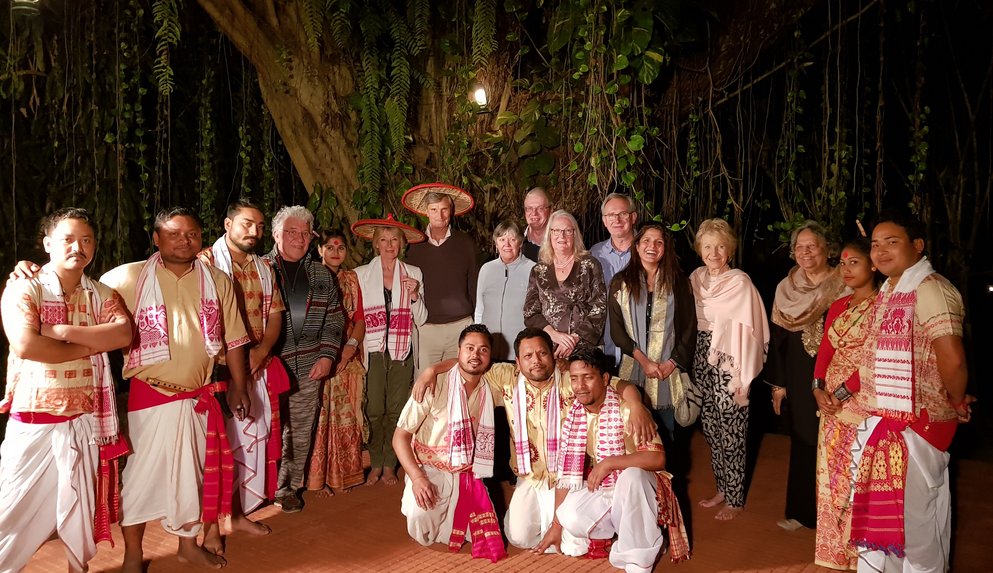

“Tea is always a good idea” and then “We are like Tea, we don't know our own Strength until we're in Hot Water” ... and yet again “Where there's tea there's hope.” Indeed, each of the quotes eulogise the wonder drink that is Tea.
Ever imagined how it actually feels to visit a Tea Estate? How Tea is manufactured? The environs surrounding Tea Estates/Gardens? And last but not the least – what does a Planter’s life entail and the actual ambience of life inside a tea plantation site that the whole world seems to be raving about; more so in times of pandemic, as the urge to live close to nature and go organic has increased phenomenally!
Assam Tea:
The fabled land of Assam in India’s colourful and majestic North East, is undoubtedly the world's largest tea producing region that produces around 400 million kgs of tea annually; it is a state where approximately 2,16,2000 hectares of land is under tea cultivation and “the jewel in the crown” of the 200 billion dollar global tea industry.
In Assam, the British left behind a rich legacy – The Legacy of Tea Garden Life. Since the planters were mostly of British or Scottish descent, they tried to recreate the quintessential British lifestyle here in India and the best specimens of the Raj era are the outstanding tea bungalows - each one has a story to tell. And, there are as many as 765 tea estates in Assam that produces approximately 13 % of the world’s tea. That is how stupendous the Tea Tourism scenario in Assam is.
Halmari Tea for instance (https://www.halmaritea.com/halmari-tour/) holds the distinction of being the highest priced Indian tea. The estate produces some of the finest varieties of CTC and Orthodox teas. Needless to say, you will find Halmari teas in some of the world’s finest hotels and in places like Harrods!
Assam is the world’s single largest Black - tea producer and the famed “Camellia Sinensis Var Assamica” has carved a niche for itself in the high end global tea marketplace.
Darjeeling Tea:
Darjeeling is often referred to as the “Queen of hill stations” and during the British rule, it used to be the summer retreat of British administrators who were instrumental in introducing tea plantations. Today the world famous Darjeeling Tea, renowned for its aroma, has worldwide acceptance and is one of the most preferred tea brands globally.
The whole of Darjeeling Himalayas are strewn with undulating tea estates and most of them are at least a century old. Glenburn, Makaibari, Happy Valley, Sourenee, Gomtee, Chamong .......are some of the top end Tea Estates surrounding Darjeeling and have a glorious heritage, which is every bit colonial British.
The Darjeeling tea is amongst the world's most expensive tea brands and prices per Kg could be as high as USD $ 850+. Makaibari Tea in particular has always been uber expensive, pegged at around USD$ 1800 per Kg.
Glenburn Tea Estate (www.glenburnteaestate.com) for instance, an 1860’s built tea company has been pioneers in promoting the concept of uber luxury colonial tea tourism in Darjeeling. There specially curated tea holidays are top notch offering the quintessential “Bungalow Holiday” experience – spacious British era rooms, vintage wooden floors (Burma Teak), cast iron windowpanes, high ceilings and intimate balconies offering uninterrupted views of the awesome Kanchendzonga – the third highest mountain in the world.
The Glenburn experience is best summed up by one of the world’s renowned travel & lifestyle publication Conde Nast Traveller thus –
“A CORNER OF HEAVEN - Stunning scenery, old fashioned elegance and the opportunity to see the rituals of tea production make Glenburn Tea Estate a compelling blend”.
Setting up an Exclusive Tea Pavilion in Davos:
The Logic Behind the Tea Pavilion at Davos:
The Pavilion in Brief:
The proposed Tea Pavilion at Davos would showcase not just Assam & Darjeeling Tea as a product; but also the ethnic tribal handloom & handicrafts of the region, the rich mosaic of tribal indigenous culture (250+ tribes) and the stupendous tourism diversity that the North East of India is blessed with.
Since the level of inquisitiveness about India’s North East tea varieties – Assam Tea & Darjeeling Tea is patronised by tea connoisseurs worldwide, a dedicated Tourism division from where prospective visitors to Davos can have a peek into the region’s rich tea heritage may also be incorporated.
The ambience inside the North East Pavilion would reflect the bamboo & cane based vernacular tribal architecture of the region - the concept of Tree House recreation for instance.....Please refer - www.vythiriresort.com/gallery.html
The idea is to sell the awesome tribal culture of North East with Tea, handicrafts and Tourism, all under one roof, which has never been attempted before.
It has always been "Tea Only". Never has it been all three - Tea, Tourism and Tribal Culture.
Links to my publications on Tea Tourism -
www.essence-magazine.co.uk/Travel_July_2017.html
www.meer.com/en/71037-tea-with-gurkhas
www.meer.com/en/70541-tea-vacations-in-post-pandemic-era
www.meer.com/en/62829-cocooned-in-darjeeling
www.meer.com/en/37712-norways-svalbard
Pictorial Links on North East Tea Estates-
www.glenburnteaestate.com/gallery.php
wildmahseer.com/accommodations/
USEFUL SUGGESTION:
Govt.of India's Ministry for the Development of North East(MDONER - mdoner.gov.in) provides liberal financial and logistical support on anything connected with India's North East.
The Tea Board of India has an exclusive Tea Promotion Directorate headed by the Director of Tea Promotion that looks after the works relating to Marketing and Promotion of tea in India and abroad.
TEA BOARD INDIA
14, B.T.M. Sarani (Brabourne Road)
Kolkata 700 001
Phone No. +91 33 2235 1331
Find us on Google Map at: goo.gl/maps/Wcoxe7k8LVv8Qsgn6
Kommentare
Verfasse einen Kommentar
Sag uns, was du von dieser Idee hältst. Bitte fülle alle Felder mit * aus. Die Angabe zu deiner E-Mail-Adresse behandeln wir vertraulich.